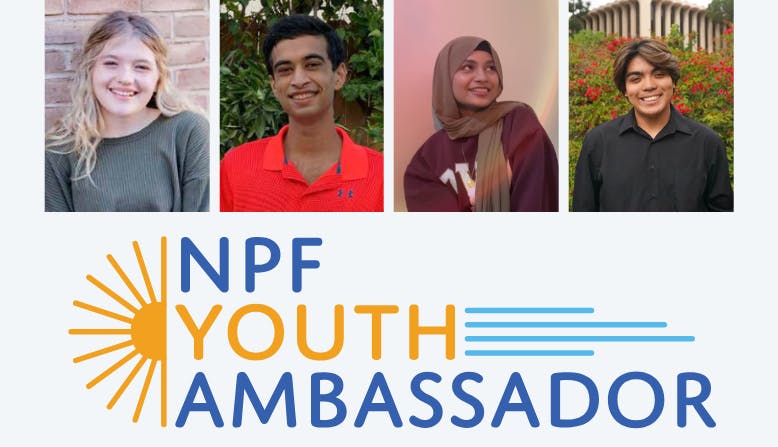Comments like “eww” and calling attention to sites you have with psoriasis are usually due to fear of catching something, fear of the unknown, and ignorance about psoriasis or psoriatic arthritis. It’s up to you if you choose to respond or walk away when someone doesn’t understand.
For Teens: Talking About Psoriatic Disease
“Ewww, what’s that on your elbow?”
Does this sound familiar? If you’ve heard a comment like this, you can choose to respond or not. It’s up to you to decide if you should.

“Once in sixth grade, a girl saw a patch on my eyelid and asked, 'Ew, is that contagious?' This comment made me realize that not everyone will understand and that I needed to pick whose opinions I really valued.”
– Sophia M., 15, lives with psoriasis and psoriatic arthritis
Key points to remember if someone says something similar to you:
Recognize you don’t have to share information when you don’t feel comfortable sharing.
You can simply say, “No, it’s not contagious,” or ignore the individual if you don’t value or want their opinion. What, when, and how much detail you share about your psoriatic disease is completely up to you. You can always provide more details later.
Psoriasis and psoriatic arthritis are chronic diseases.
This means you will live with them for the rest of your life. The disease will sometimes be better and in control, and other times flares of the disease will make it worse.
Identify a way to shut the conversation down.
You can use a short response such as, "I have psoriasis and it’s not contagious,” and move on or deflect to another topic.
Don’t let negative talk or thoughts get to you.
Ignore negative comments or thoughts by telling yourself “I don’t have time for such thoughts” or “I’m better than this.” Remember, the individual who made the comments has the problem; you don’t. Try redirecting your thoughts with comments like:
- I will not let this situation define me.
- I am worthy of respect, no matter how different I am.
- I love and accept myself even when others don’t understand what I have.
- Let’s focus on what happened today that was good. I deserve good things.
- My life has value, even on the hardest days.
- I am enough.
- I am not alone in this.
- I choose to feel good about myself.
Remember that psoriasis doesn’t define who you are as an individual.
It’s part of who you are. You are unique.
“Be proud of who you are and be even prouder that your uniqueness is what makes you—you. Let people know that you are just fine in your own skin. Do not let others define you. Strength comes from inside you. Use it.”
– Shane W., 16, lives with psoriasis and psoriatic arthritis
Develop a set response.
This will help you feel more confident about how to respond and not make you feel surprised or anxious about what to say. Be confident in saying, “It’s not contagious and no, you are not in danger of catching anything.” You may be surprised by how supportive people can be once they know how the disease affects you. Sometimes all it takes is education and helping someone to learn about what you have.
If someone asks about your skin, say:
"Just so you know, the spots on my skin are from something called psoriasis. It’s a skin condition I’ve had for a while—it’s not contagious or anything like that. Basically, my immune system speeds up how fast my skin grows, which causes these dry red patches to show up. It comes and goes, and while it can be uncomfortable sometimes, I'm learning how to manage it."
– Elaina F. lives with psoriasis
“The best thing to do is to remember that psoriasis isn’t a disease that every single person knows about, especially kids. The first thing I would say to my friends who asked about it is: ‘No, it is not a rash, it’s a disease called psoriasis. It shows up on my skin and it is not contagious. I was born with it and I’ve always had it and always will.’ These three sentences are all you have to say and then move on to another topic.”
– Alex F., 15, lives with psoriasis
If someone says you’re too young to have arthritis, respond with:
"It's definitely not common! But there are many teens and kids in the world who live and persevere through arthritis."
– Sophia M., 15, lives with psoriasis and psoriatic arthritis
Identify and use your support system when you need to.
It may help to think about “Who are the people in my life that I could share all my feelings about psoriatic disease with?” Find who and what you feel comfortable in sharing, such as what it’s like to live with psoriatic disease, what triggers your disease, and how it’s managed. Someone who can be there to offer you support when you are not feeling well, when you are being bullied, or when you feel stressed. Start small by saying “I have psoriasis,” and as you feel more comfortable, include more information.
If you find yourself being bullied because of your psoriatic disease, remember that it is not okay. You can choose to explain what you have. If the bullying continues, remember you do not have to stop the bullying on your own. Find a teacher, principal, coach, or counselor to talk about what’s occurring and how best to address the issue. Learn more about ways to respond to bullying.
Being open about your disease can help others learn more about psoriasis and psoriatic arthritis, what it means to live with the disease, and how to be more supportive when you need it.
Additional Resources

Patient Navigation Center
Contact the Patient Navigation Center for free, personalized guidance and support for psoriasis and psoriatic arthritis.

School Resources
Access resources to help educate school staff and classmates about psoriasis and psoriatic arthritis.

Become a Youth Ambassador
Find others who understand and develop friendships with other youth with psoriasis and psoriatic arthritis. Serve as a leader in our community.
Connect with Others
Find an event near you and connect with others living with psoriasis and psoriatic arthritis.